Mark Crovella
Boston University
Evaluating LLP Methods: Challenges and Approaches
Oct 29, 2023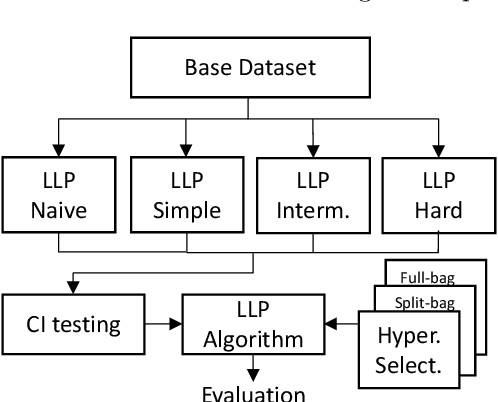

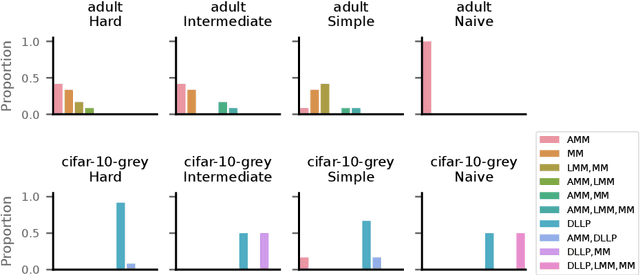
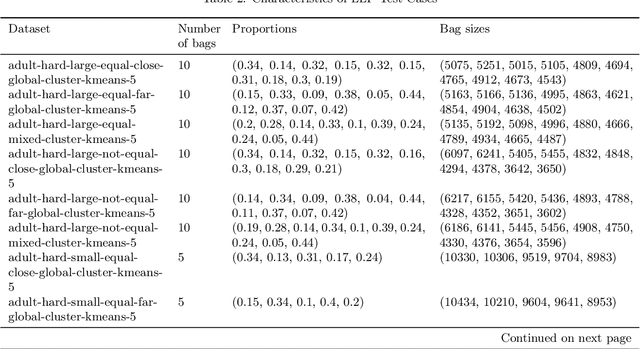
Abstract:Learning from Label Proportions (LLP) is an established machine learning problem with numerous real-world applications. In this setting, data items are grouped into bags, and the goal is to learn individual item labels, knowing only the features of the data and the proportions of labels in each bag. Although LLP is a well-established problem, it has several unusual aspects that create challenges for benchmarking learning methods. Fundamental complications arise because of the existence of different LLP variants, i.e., dependence structures that can exist between items, labels, and bags. Accordingly, the first algorithmic challenge is the generation of variant-specific datasets capturing the diversity of dependence structures and bag characteristics. The second methodological challenge is model selection, i.e., hyperparameter tuning; due to the nature of LLP, model selection cannot easily use the standard machine learning paradigm. The final benchmarking challenge consists of properly evaluating LLP solution methods across various LLP variants. We note that there is very little consideration of these issues in prior work, and there are no general solutions for these challenges proposed to date. To address these challenges, we develop methods capable of generating LLP datasets meeting the requirements of different variants. We use these methods to generate a collection of datasets encompassing the spectrum of LLP problem characteristics, which can be used in future evaluation studies. Additionally, we develop guidelines for benchmarking LLP algorithms, including the model selection and evaluation steps. Finally, we illustrate the new methods and guidelines by performing an extensive benchmark of a set of well-known LLP algorithms. We show that choosing the best algorithm depends critically on the LLP variant and model selection method, demonstrating the need for our proposed approach.
Fair Inputs and Fair Outputs: The Incompatibility of Fairness in Privacy and Accuracy
May 24, 2020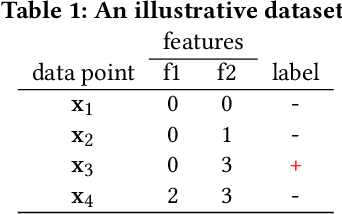
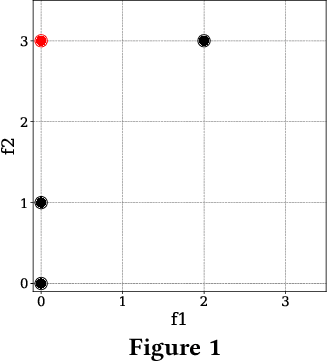
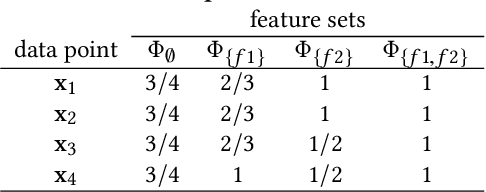
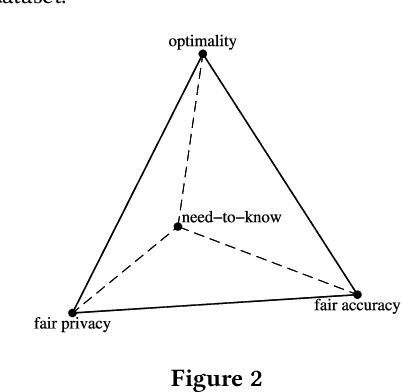
Abstract:Fairness concerns about algorithmic decision-making systems have been mainly focused on the outputs (e.g., the accuracy of a classifier across individuals or groups). However, one may additionally be concerned with fairness in the inputs. In this paper, we propose and formulate two properties regarding the inputs of (features used by) a classifier. In particular, we claim that fair privacy (whether individuals are all asked to reveal the same information) and need-to-know (whether users are only asked for the minimal information required for the task at hand) are desirable properties of a decision system. We explore the interaction between these properties and fairness in the outputs (fair prediction accuracy). We show that for an optimal classifier these three properties are in general incompatible, and we explain what common properties of data make them incompatible. Finally we provide an algorithm to verify if the trade-off between the three properties exists in a given dataset, and use the algorithm to show that this trade-off is common in real data.
Fighting Fire with Fire: Using Antidote Data to Improve Polarization and Fairness of Recommender Systems
Jan 14, 2019

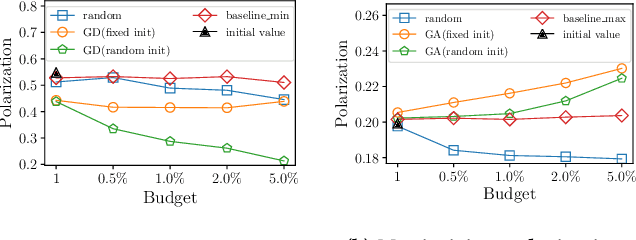

Abstract:The increasing role of recommender systems in many aspects of society makes it essential to consider how such systems may impact social good. Various modifications to recommendation algorithms have been proposed to improve their performance for specific socially relevant measures. However, previous proposals are often not easily adapted to different measures, and they generally require the ability to modify either existing system inputs, the system's algorithm, or the system's outputs. As an alternative, in this paper we introduce the idea of improving the social desirability of recommender system outputs by adding more data to the input, an approach we view as as providing `antidote' data to the system. We formalize the antidote data problem, and develop optimization-based solutions. We take as our model system the matrix factorization approach to recommendation, and we propose a set of measures to capture the polarization or fairness of recommendations. We then show how to generate antidote data for each measure, pointing out a number of computational efficiencies, and discuss the impact on overall system accuracy. Our experiments show that a modest budget for antidote data can lead to significant improvements in the polarization or fairness of recommendations.
Matrix completion with queries
May 01, 2017
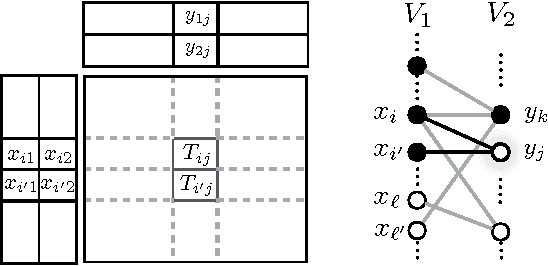

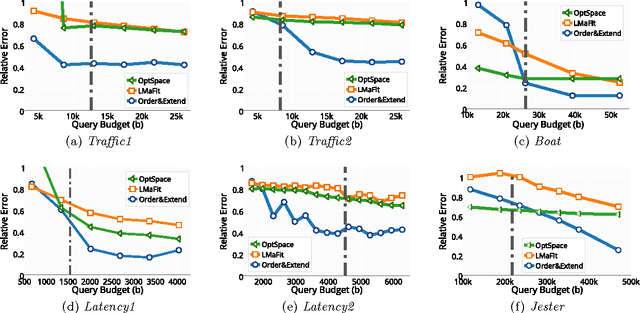
Abstract:In many applications, e.g., recommender systems and traffic monitoring, the data comes in the form of a matrix that is only partially observed and low rank. A fundamental data-analysis task for these datasets is matrix completion, where the goal is to accurately infer the entries missing from the matrix. Even when the data satisfies the low-rank assumption, classical matrix-completion methods may output completions with significant error -- in that the reconstructed matrix differs significantly from the true underlying matrix. Often, this is due to the fact that the information contained in the observed entries is insufficient. In this work, we address this problem by proposing an active version of matrix completion, where queries can be made to the true underlying matrix. Subsequently, we design Order&Extend, which is the first algorithm to unify a matrix-completion approach and a querying strategy into a single algorithm. Order&Extend is able identify and alleviate insufficient information by judiciously querying a small number of additional entries. In an extensive experimental evaluation on real-world datasets, we demonstrate that our algorithm is efficient and is able to accurately reconstruct the true matrix while asking only a small number of queries.
Targeted matrix completion
Apr 30, 2017



Abstract:Matrix completion is a problem that arises in many data-analysis settings where the input consists of a partially-observed matrix (e.g., recommender systems, traffic matrix analysis etc.). Classical approaches to matrix completion assume that the input partially-observed matrix is low rank. The success of these methods depends on the number of observed entries and the rank of the matrix; the larger the rank, the more entries need to be observed in order to accurately complete the matrix. In this paper, we deal with matrices that are not necessarily low rank themselves, but rather they contain low-rank submatrices. We propose Targeted, which is a general framework for completing such matrices. In this framework, we first extract the low-rank submatrices and then apply a matrix-completion algorithm to these low-rank submatrices as well as the remainder matrix separately. Although for the completion itself we use state-of-the-art completion methods, our results demonstrate that Targeted achieves significantly smaller reconstruction errors than other classical matrix-completion methods. One of the key technical contributions of the paper lies in the identification of the low-rank submatrices from the input partially-observed matrices.
Multidimensional Scaling in the Poincare Disk
Feb 12, 2016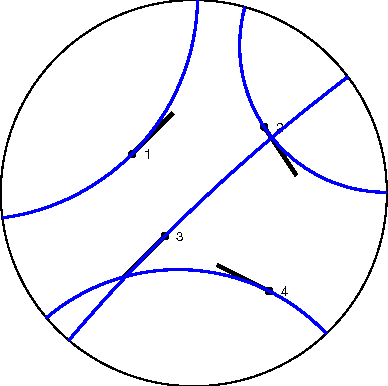
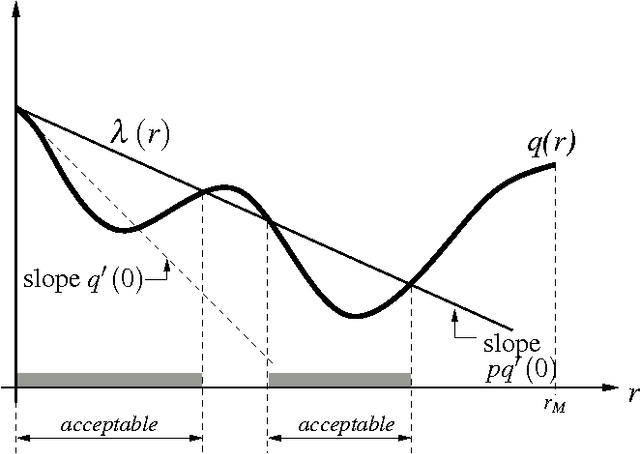
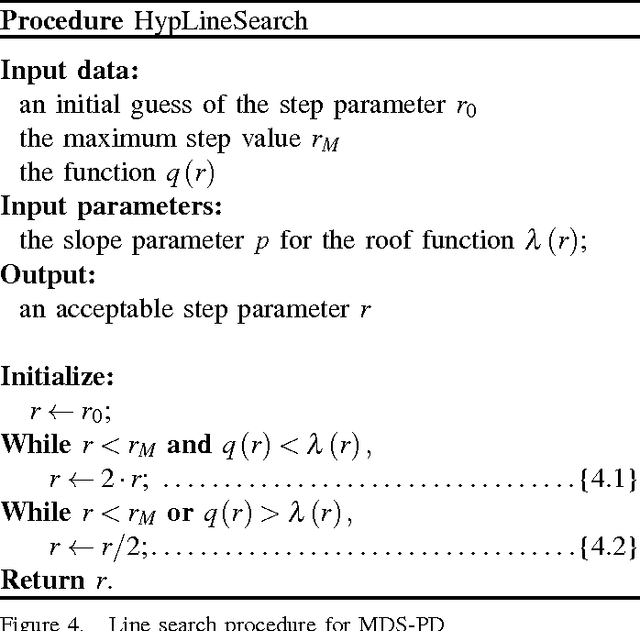
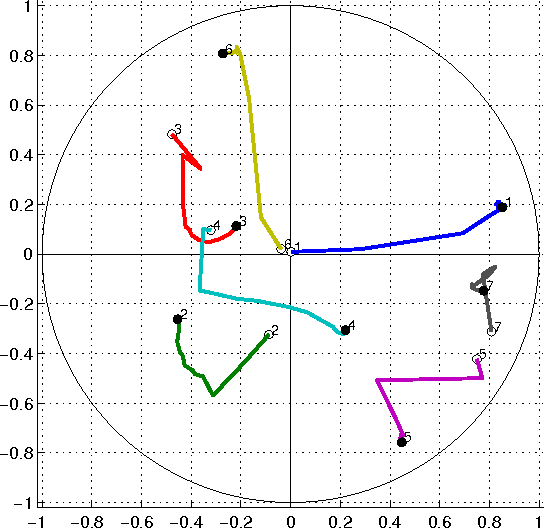
Abstract:Multidimensional scaling (MDS) is a class of projective algorithms traditionally used in Euclidean space to produce two- or three-dimensional visualizations of datasets of multidimensional points or point distances. More recently however, several authors have pointed out that for certain datasets, hyperbolic target space may provide a better fit than Euclidean space. In this paper we develop PD-MDS, a metric MDS algorithm designed specifically for the Poincare disk (PD) model of the hyperbolic plane. Emphasizing the importance of proceeding from first principles in spite of the availability of various black box optimizers, our construction is based on an elementary hyperbolic line search and reveals numerous particulars that need to be carefully addressed when implementing this as well as more sophisticated iterative optimization methods in a hyperbolic space model.
 Add to Chrome
Add to Chrome Add to Firefox
Add to Firefox Add to Edge
Add to Edge